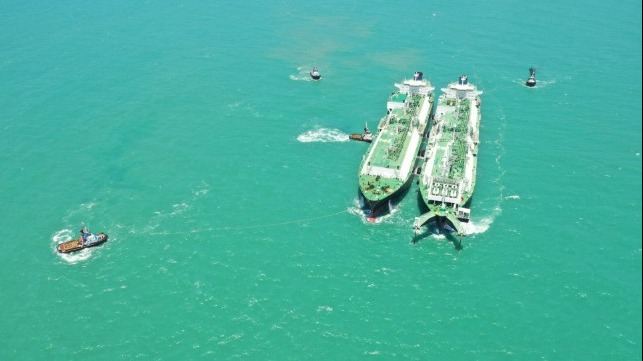Wilson Sons Meets Increased Demand for Ship-to-Ship LNG Operations

[By: Wilson Sons]
With the increase in the activity of thermoelectric plants in 2021, Wilson Sons registered in the last 10 months a record of ship-to-ship operations (STS). The Company's towage unit operated in more than 15 operations to transfer liquefied natural gas (LNG) from gas tankers to Floating Storage Regasification Units (FSRU): most of which took place at Celse's terminal in Barra dos Coqueiros (SE), followed by the GNA’s terminal at Açu Port (RJ).
Only in October, there were six STS operations, one of which with a Q-FLEX vessel, considered one of the largest in the world with a capacity of 215,000 m³ of gas: a record for the sector. By the end of this year, five more operations are planned in Sergipe. “The year of 2022 also promises good results for the port support market in the LNG sector. Three new terminals should go into operation, such as the one in Barcarena, the Gas Sul in Santa Catarina and the third in Suape”, highlights Elísio Dourado, commercial director of the unit.
Today, five LNG terminals, which use FSRUs, are in operation in Brazil. There are three from Petrobras, one from Celse and one from GNA. Wilson Sons operates at the Petrobras unit in Pecém (CE), in addition to Celse and GNA terminals. "The outlook remains positive in the medium term, with the possibility of new operators entering the market for gas to wire projects, when the thermoelectric plant is installed close to the natural gas producing field, and small scale (LNG on a small scale)”, evaluates Dourado.
The Company is prepared to meet the increased demand. With 80 tugs, it has the largest and most powerful fleet on the Brazilian coast – 93% of the tugs have azimuthal propulsion (ASD) and four are escort tugs – and, this year, the construction of a series of six other high-powered vessels has begun in the Wilson Sons shipyard in Guarujá (SP). “The new units will have IMO TIER III standard, with a reduction of more than 75% of the emissions of nitrogen oxides, which is considered a greenhouse gas”, says the director.
LNG STS operations are highly complex and require a high level of safety, especially when carried out in open sea, where navigation circumstances demand great attention. “Safety is, without a doubt, one of the main pillars of the Wilson Sons Group. In addition to the experience of our professionals, we have a robust structure that, together, are differentials for our clients in this sector, as we work with them from the planning of the project and each operation which allows us to guarantee the success of the job, even with a high level of complexity”, explains Dourado.
An important ally in this regard is the Towage Operations Center (COR). The unit monitors vessels 24 hours a day, in real time, through the AIS antenna network and uses technologies such as artificial intelligence to develop maneuvering strategies. The Towage division also has a Maritime Improvement Center, comprising its own maneuver simulator, capable of forecasting different operational scenarios. The equipment is used to systematically train the company's staff of maritime professionals, managers and support teams, in addition to being used by customers and partners for the preparation and testing of large-scale projects and operations.
The products and services herein described in this press release are not endorsed by The Maritime Executive.
